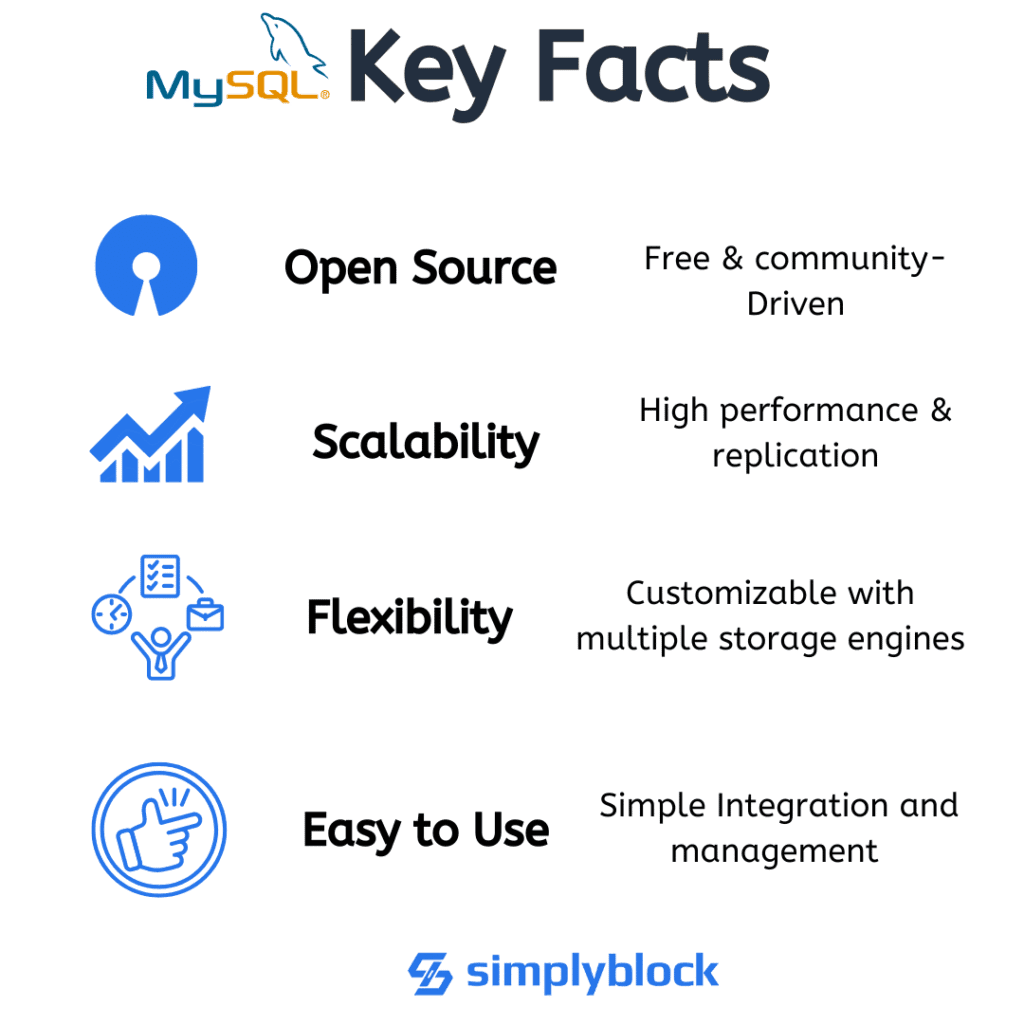MySQL
Terms related to simplyblock
MySQL is an open-source relational database management system (RDBMS) developed originally by MySQL AB and now maintained by Oracle Corporation. It uses structured query language (SQL) for managing and manipulating data and follows the relational model, where data is stored in tables consisting of rows and columns.
As a core component of the LAMP stack (Linux, Apache, MySQL, PHP/Perl/Python), MySQL is a backbone technology behind countless web applications, content management systems (CMS), and e-commerce platforms.
Core Features of MySQL
MySQL provides a blend of simplicity, performance, and extensibility, making it suitable for both small web applications and large-scale enterprise deployments. Key features include:
- SQL Language Support: Full support for ANSI SQL and extensions for stored procedures, triggers, views, and functions.
- Storage Engines: Pluggable engine architecture with InnoDB as the default for ACID compliance and transaction support.
- Replication: Built-in support for master-slave, semi-synchronous, and multi-source replication.
- Security: Includes user authentication, SSL/TLS encryption, and role-based access control.
- Partitioning and Sharding: Supports partitioned tables and can be sharded externally.
- Performance Tools: Query caching, optimizer hints, and index tuning features.
- Cross-Platform: Runs on Linux, Windows, and macOS with strong community and enterprise support.
MySQL vs Other Relational Databases
MySQL is known for ease of use and high performance for read-heavy workloads. Compared to other RDBMS platforms, it offers:
Comparison Table
| Feature | MySQL | PostgreSQL | Microsoft SQL Server | Oracle Database |
|---|---|---|---|---|
| License | GPL (Community) | PostgreSQL License | Proprietary | Proprietary |
| ACID Compliance | Yes (InnoDB) | Full | Full | Full |
| SQL Extensions | Limited | Rich | T-SQL | PL/SQL |
| JSON Support | Basic | Native JSONB | Native | JSON Support |
| Clustering | Galera (external) | Citus (extension) | Always On AG | RAC |
| Best Fit | Web applications | Complex workloads | Enterprise systems | High-end enterprise |
While MySQL is less feature-rich than PostgreSQL or Oracle for analytical and transactional workloads, it offers fast deployment and low operational complexity, especially when combined with scalable storage.

Use Cases for MySQL
MySQL powers a wide range of applications due to its balance of performance and simplicity:
- Web and CMS Platforms: Used by WordPress, Joomla, Drupal, and Magento.
- E-commerce: Handles product catalogs, shopping carts, and transactions efficiently.
- Gaming & Mobile Backends: Provides structured persistence for high-volume apps.
- Data Warehousing (Basic): With external tooling, MySQL can support small to medium-scale analytics.
- Dev/Test Environments: Lightweight and fast to deploy for local testing and CI/CD pipelines.
For high-performance applications that demand low-latency storage, MySQL benefits significantly from NVMe-based storage solutions like simplyblock™, especially in containerized environments.
Storage Considerations for MySQL
The default MySQL storage engine, InnoDB, is optimized for transactional workloads with row-level locking, foreign key constraints, and crash recovery using write-ahead logs (WAL). Key storage performance considerations include:
- IOPS: High read/write throughput is crucial for transactional and mixed workloads.
- Durability: Write-intensive workloads benefit from fast, low-latency storage.
- Data Integrity: WAL-based durability mechanisms depend on reliable block storage.
When MySQL is deployed on Kubernetes or hybrid clouds, using NVMe over TCP from simplyblock ensures:
- Sub-millisecond latency
- Thin provisioning for storage efficiency
- Advanced erasure coding for redundancy
- High IOPS without overprovisioning SSDs
MySQL in Kubernetes and Cloud-Native Environments
MySQL can be deployed with StatefulSets and Helm charts in Kubernetes, providing persistent volumes with CSI drivers. Key benefits of integrating MySQL with simplyblock for Kubernetes include:
- Dynamic volume provisioning
- Scalable storage backends with NVMe performance
- Secure multi-tenant environments with QoS controls
- Snapshots and clones for fast backups and test data provisioning
This setup is particularly effective for SaaS applications or cloud-native microservices using MySQL as a transactional backbone.
Related Terms
MySQL deployments tend to surface these topics when you’re tuning transaction durability and p99 performance for NVMe/TCP-backed Kubernetes Storage running on Software-defined Block Storage.
- Write-Ahead Log (WAL)
- IOPS (Input/Output Operations Per Second)
- Storage Latency
- Kubernetes StatefulSet
External References
Questions and Answers
MySQL remains a top choice for developers due to its open-source nature, stability, and strong community support. It powers web apps, SaaS platforms, and data-driven services thanks to its ease of use, wide compatibility, and efficient performance for OLTP workloads.
Yes, MySQL can run efficiently on Kubernetes using StatefulSets and persistent volumes. For stable performance and durability, use Kubernetes-native NVMe storage to enable fast recovery, high IOPS, and data consistency across pod restarts.
MySQL performance improves significantly with low-latency, high-throughput storage. NVMe over TCP provides ideal conditions for fast queries and low write latency. It’s especially beneficial for write-heavy apps and replication-based setups.
Yes, MySQL includes native support for Transparent Data Encryption (TDE). To improve security and compliance further, you can integrate it with storage platforms that offer encryption at rest and key isolation at the volume level.
MySQL supports logical separation using schemas or databases per tenant. For physical isolation and security, pair it with Simplyblock’s software-defined storage and multi-tenant encryption to protect customer data in cloud or container environments.
